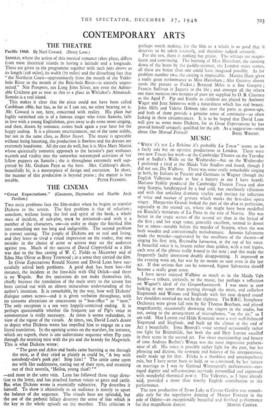THE CINEMA
Two main problems face the film-maker when he begins to transfer Dickens to the screen. The first problem is that of selection ; somehow, without losing the feel and spirit of the book, a whole mass of incident, of sub-plot, mum be jettisoned—and with it a number of the characters, too—in order to shape the finished film into something not too long and indigestible. The second problem is correct casting. The people of Dickens are so real and living, and they leave so vivid a visual impression on the reader, that one mistake in the choice of actor or actress may set the audience against you. Much of the success of David Copperfield as a film was due to the fine casting of W. C. Fields as Micawber and of Edna May Oliver as Betsy Trotwood ; in a sense they carried the film. In Great Expectations Ronald Neame and David Lean have suc- cessfully solved both problems. A good deal has been lost—for instance, the incident at the lime-kiln with Old Orlick—and there is no Wopsle. But the omissions do not make themselves felt, chiefly because the translation of the main story to the screen has been carried out with an almost miraculous understanding of the author's intention. It is remarkable, by the way, how well Dickens' dialogue comes across—and it is given verbatim throughout, with no tiresome alterations or concessions to " box-office " or " taste." The only exception is a not very happily-contrived ending. It is perhaps questionable whether the frequent use of Pip's voice as commentator is really necessary. At times it seems redundant, in view of the vigour of the visuals. At times, too, David Lean's desire to depict what Dickens wrote has impelled him to engage on a too literal translation. In the opening scenes on the marshes, for instance, which are superb, there is one unfortunate sequence when Pip runs through the morning mist with the pie and the brandy for Magwitch. This is what Dickens wrote: " The gates and dykes and banks came bursting at me through the mist, as if they cried as plainly as could be, `A boy with somebody-else's pork pie! Stop him I ' The cattle came upon me with like suddenness, staring out of their eyes, and steaming out of their nostrils, Holloa, young thief I '" —and more in the same vein. Lean has followed these stage direc- tion to the letter, and has attached human voices to gates and cattle. But what Dickens wrote is essentially subjective. Pip describes it himself. To show it objectively to an audience is merely to upset the balance of the sequence. The visuals here are splendid, but the use of the pathetic fallacy destroys the sense of fear which is the key to the whole episode on the marshes. This criticism is perhaps worth making, for the film as a whole is so good that it deserves to be taken seriously, and therefore judged seriously.
For the rest, there is nothing but praise. The settings are magni- ficent and convincing. The burning of Miss Havisham, the running down of the boats by the paddle-steamer, the London street scenes, all these are better than one could have imagined possible. As for problem number two, the casting is impeccable. Martita Hunt gives a really great performance as Miss Havisham ; Alec Guiness almoSt steals the picture as Pocket ; Bernard Miles is a fine Gargery ; Francis Sullivan is Jaggers to the life ; and amongst all the others one must mention two minutes of pure joy supplied by 0. B. Clarence as the Aged P. Pip and Estella as children are played by Anthony Wager and Jean Simmons with a naturalness which has real beauty. John Mills and Valerie Hobson take over the parts as grown-ups, and both of them provide a genuine sense of continuity—so often lacking in these circumstances. It is to be hoped that David Lean will give us some more Dickens, for in Great Expectations he has proved himself uniquely qualified for the job. As a suggestion—what






























 Previous page
Previous page